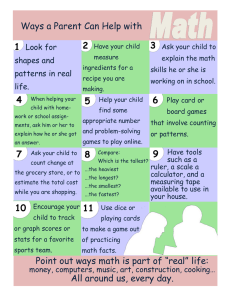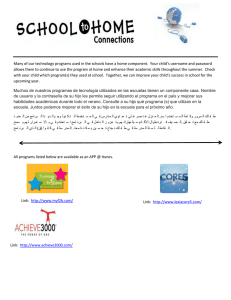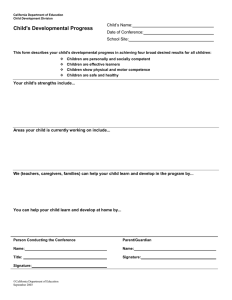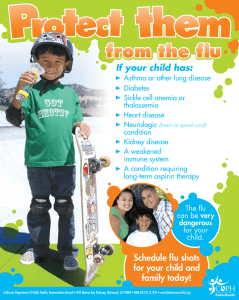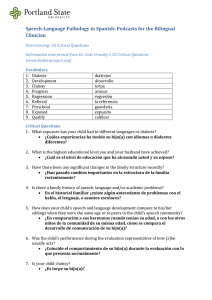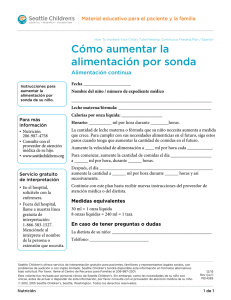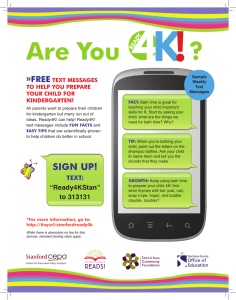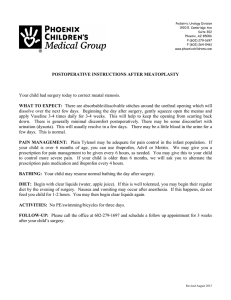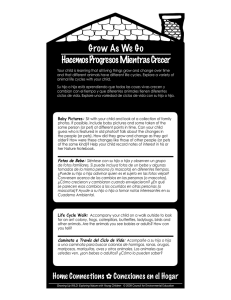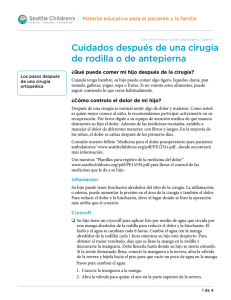PE1148S Care Before a Surgery or Procedure
Anuncio
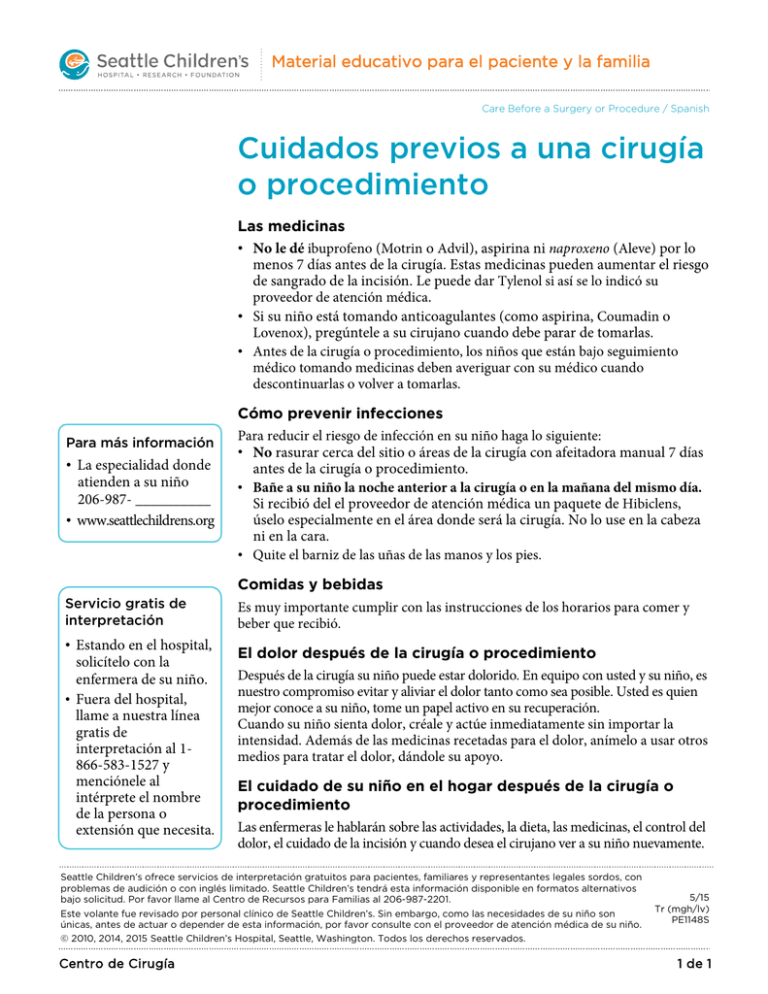
Material educativo para el paciente y la familia Care Before a Surgery or Procedure / Spanish Cuidados previos a una cirugía o procedimiento Las medicinas • No le dé ibuprofeno (Motrin o Advil), aspirina ni naproxeno (Aleve) por lo menos 7 días antes de la cirugía. Estas medicinas pueden aumentar el riesgo de sangrado de la incisión. Le puede dar Tylenol si así se lo indicó su proveedor de atención médica. • Si su niño está tomando anticoagulantes (como aspirina, Coumadin o Lovenox), pregúntele a su cirujano cuando debe parar de tomarlas. • Antes de la cirugía o procedimiento, los niños que están bajo seguimiento médico tomando medicinas deben averiguar con su médico cuando descontinuarlas o volver a tomarlas. Para más información • La especialidad donde atienden a su niño 206-987- __________ • www.seattlechildrens.org Servicio gratis de interpretación • Estando en el hospital, solicítelo con la enfermera de su niño. • Fuera del hospital, llame a nuestra línea gratis de interpretación al 1866-583-1527 y menciónele al intérprete el nombre de la persona o extensión que necesita. Cómo prevenir infecciones Para reducir el riesgo de infección en su niño haga lo siguiente: • No rasurar cerca del sitio o áreas de la cirugía con afeitadora manual 7 días antes de la cirugía o procedimiento. • Bañe a su niño la noche anterior a la cirugía o en la mañana del mismo día. Si recibió del el proveedor de atención médica un paquete de Hibiclens, úselo especialmente en el área donde será la cirugía. No lo use en la cabeza ni en la cara. • Quite el barniz de las uñas de las manos y los pies. Comidas y bebidas Es muy importante cumplir con las instrucciones de los horarios para comer y beber que recibió. El dolor después de la cirugía o procedimiento Después de la cirugía su niño puede estar dolorido. En equipo con usted y su niño, es nuestro compromiso evitar y aliviar el dolor tanto como sea posible. Usted es quien mejor conoce a su niño, tome un papel activo en su recuperación. Cuando su niño sienta dolor, créale y actúe inmediatamente sin importar la intensidad. Además de las medicinas recetadas para el dolor, anímelo a usar otros medios para tratar el dolor, dándole su apoyo. El cuidado de su niño en el hogar después de la cirugía o procedimiento Las enfermeras le hablarán sobre las actividades, la dieta, las medicinas, el control del dolor, el cuidado de la incisión y cuando desea el cirujano ver a su niño nuevamente. Seattle Children’s ofrece servicios de interpretación gratuitos para pacientes, familiares y representantes legales sordos, con problemas de audición o con inglés limitado. Seattle Children’s tendrá esta información disponible en formatos alternativos bajo solicitud. Por favor llame al Centro de Recursos para Familias al 206-987-2201. Este volante fue revisado por personal clínico de Seattle Children’s. Sin embargo, como las necesidades de su niño son únicas, antes de actuar o depender de esta información, por favor consulte con el proveedor de atención médica de su niño. © 2010, 2014, 2015 Seattle Children’s Hospital, Seattle, Washington. Todos los derechos reservados. Centro de Cirugía 5/15 Tr (mgh/lv) PE1148S 1 de 1 Patient and Family Education Care Before a Surgery or Procedure To Learn More • Your child’s specialty clinic 206-987- __________ • www.seattlechildrens.org Taking medicines • Do not give ibuprofen (Motrin or Advil), aspirin or naproxen (Aleve) for at least 7 days before the surgery. These medicines can increase the risk of bleeding from the surgical site. It is OK to give acetaminophen (Tylenol), if recommended by your child’s healthcare provider. • If your child is taking an anticoagulant (like aspirin, Coumadin or Lovenox), call your surgeon for the stop date. • Children under the care of a medical provider should ask for instructions on stopping or continuing medicines before the surgery or procedure. Preventing infection To lower your child’s risk of getting an infection: • Do not shave near the surgical site areas with a hand-held razor within 7 days before the surgery or procedure. • Give your child a bath the night before or morning of the surgery or procedure. If you were given a Hibiclens packet by your healthcare provider, use it. Pay special attention to the surgical site, but do not use it on the head or face. • Remove nail polish from your child’s fingers and toes. Free Interpreter Services • In the hospital, ask your child’s nurse. • From outside the hospital, call the toll-free Family Interpreting Line 1-866-583-1527. Tell the interpreter the name or extension you need. Eating and drinking It is very important to follow the eating and drinking instructions from the scheduling staff. Pain after the surgery or procedure After a surgery or procedure, your child may feel pain. In partnership with you and your child, we are committed to the prevention and relief of pain as completely as possible. You know your child best. Take an active part in your child’s recovery. No matter the level of your child’s pain, believe they are hurting and respond right away. In addition to medicine prescribed for pain, encourage coping tools to treat pain and provide support. Caring for your child at home after the surgery or procedure The nurses will go over activity, diet, medicine, pain, surgical site care and when the surgeon wants to see your child again. Seattle Children’s offers interpreter services for Deaf, hard of hearing or non-English speaking patients, family members and legal representatives free of charge. Seattle Children’s will make this information available in alternate formats upon request. Call the Family Resource Center at 206-987-2201. This handout has been reviewed by clinical staff at Seattle Children’s. However, your child’s needs are unique. Before you act or rely upon this information, please talk with your child’s healthcare provider. © 2010, 2014, 2015 Seattle Children’s, Seattle, Washington. All rights reserved. Surgery Center 5/15 PE1148 1 of 1
